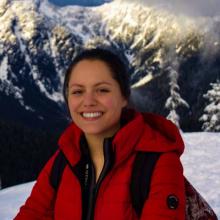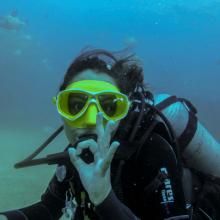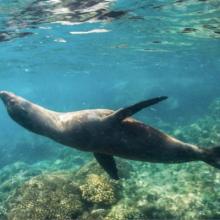Ana Pozas
Why did you decide to pursue a graduate degree?
Interestingly, this decision came to be in light of the COVID-19 pandemic. Instead of searching for a job after graduation, I decided pursuing further education would be a better idea. It would allow me to build on my current knowledge and strengthen my scientific credibility, while allowing me to specialize in an area of marine science. I am extremely glad about making this decision because I am quickly recognizing the benefits it can bring in terms of getting to know researchers in my field, building connections, learning the intricacies of scientific research, and facing new exciting challenges. A change in plans can sometimes end up being the better option!
Why did you decide to study at UBC?
I first decided to attend UBC for my undergraduate degree after finishing the last two years of high school here in Vancouver. I really liked how UBC was close to the beach and forests that motivated me when completing my Bachelor's in biology. I soon realized the big community of researchers that are experts in the fields of science and conservation. After graduating, I had built good connections with faculty members, including my current supervisor. I recognized the potential of growing within that community, and decided to also complete my Master's at UBC.
What is it specifically, that your program offers, that attracted you?
The Master's in Oceans and Fisheries is a relatively new program at UBC. Fisheries have historically been viewed through an economic lens that dangerously lacks the science and understanding of marine ecosystems. Integrating biology, conservation, economics and other disciplines is what I think the Institute for the Oceans and Fisheries (IOF) does uniquely well. It is very exciting and motivating to form part of this institute that approaches fisheries and marine ecosystems with an innovative and new perspective. I can appreciate and identify with that mentality!
What was the best surprise about UBC or life in Vancouver?
During my undergraduate degree at UBC I took a marine biology course in the Bamfield Marine Sciences Centre in Vancouver Island - a remote town surrounded by nature and the ocean. This experience sparked my interest in marine biology and contributed to my passion for nature and conservation. To this day, I am amazed by the natural landscapes Vancouver has to offer and I feel extremely lucky to be able to not only enjoy them, but also learn about them.
What do you see as your biggest challenge(s) in your future career?
My career goal is to contribute to conservation through science communication. This can be a challenge when trying to make positive changes in areas that might not value or understand what the science tells us. It can be extremely challenging to change people's mind's or shift aspects about how the world currently works. However, understanding and communicating the science and solutions that can bring positive change is a crucial step. I look forward to having both small and large victories when facing this challenge.
What aspects of your life or career before now have best prepared you for your UBC graduate program?
Academically, specific courses at UBC exposed me to research and collaboration with faculty members. Knowing the people in the field and how they carry out their work was extremely valuable. Completing the co-op program was a key aspect of gaining valuable skills and experience, outside of academia, that gave me the tools and knowledge I needed to pursue my interests.
What do you like to do for fun or relaxation?
Diving is definitely an activity that I wish I could spend more time doing! I am passionate about using photography to communicate science for conservation, and taking underwater photos of marine life while diving allows me to do so. If I'm not by the water, I'm staying active outdoors, or staying in listening to good music.
What advice do you have for new graduate students?
Whether you feel it or not, 'the world is your oyster'. Making an impact, overcoming new challenges, getting where you want to be, are all part of the learning process of completing a graduate degree and in my opinion, knowing what your motivations are can get you very far if you are proactive and passionate about it. UBC opens its doors to your potential, so it is important to explore it to its fullest.



